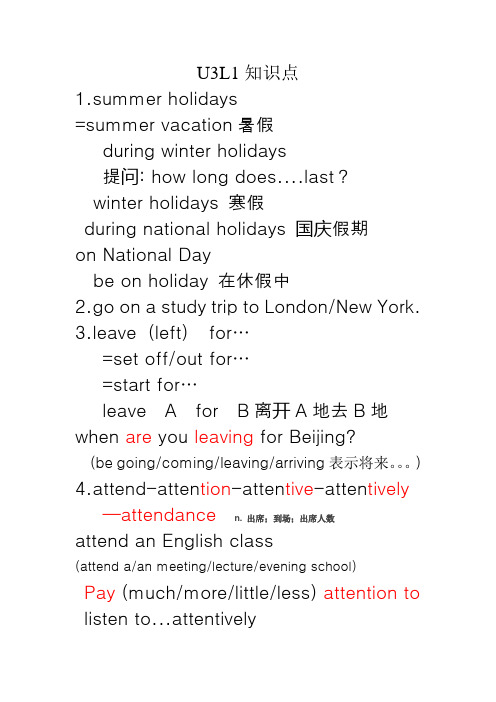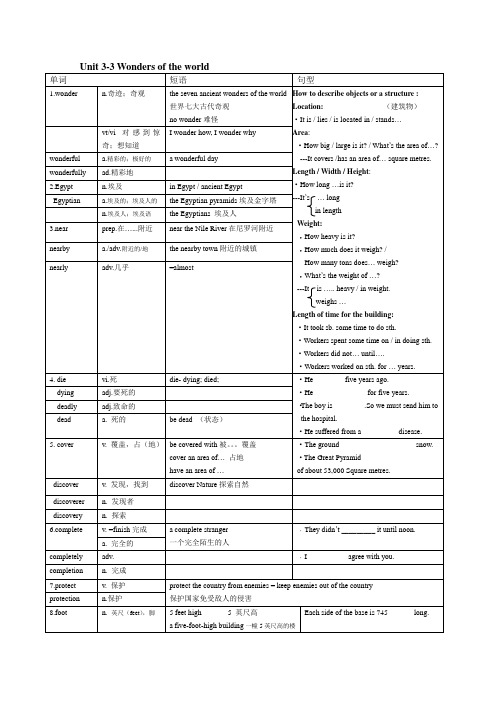新世纪英语第三单元笔记
- 格式:doc
- 大小:10.32 MB
- 文档页数:17

追求以公众利益为宗旨的幸福理查德·莱亚德在过去的50年里,我们西方国家的经济获得了史无前例的增长。
我们的家园、车辆、假期、工作、教育,尤其是健康,均得以改善。
依据标准经济理论,这些改善原本应该使我们更加幸福,然而,调查显示并非如此。
英国人和美国人接受幸福程度的调查时说,在过去的50年里,他们的幸福程度并没有得到改善。
抑郁症患者人数上升,同时犯罪率大幅增长也说明了人们对生活的不满足。
上述事实对我们个人以及社会优先考虑的诸多事情都提出了挑战。
事实上,我们现在的处境是人类从未经历过的。
当大多数人还在为温饱发愁时,物质条件的改善的确能令他们幸福一些。
富庶国家(比如,人均年收入在两万美元以上)的人民比贫穷国家的人民幸福一些;而贫穷国家的人民,如果稍微富裕,也会幸福得多。
然而,物质上的匮乏一旦消除,收入的增加便不如亲情、友情、邻里和睦等人际关系那么重要。
但是,我们在追求更高的收入时牺牲了太多这样的关系,这很危险。
渴望幸福是人类本性的核心。
人人都渴望这样一个社会:人们尽可能地幸福,每个人的幸福同等重要。
这应当是我们这个时代的人生哲学,应当用来指导公共利益的维护准则和每个人的行为,应当逐渐取代无法使我们更加幸福的极端的个人主义。
金钱的确是影响个人幸福的关键因素之一。
但是,金钱本身能使我们最终获得幸福吗?在任何一个社会,富人往往比穷人幸福。
然而,当一个西方国家越来越富有的时候,其人民的幸福程度在总体上并未得到改善。
随着时间的推移,我们的标准和期望随着收入的增加而上升。
盖洛普民意测验每年都向美国人提问:“一个四口之家至少需要多少钱才能在这个国家生活下去?”人们说出的数字上升的幅度与平均收入增加的幅度是一样的。
因为人们总是拿自己的收入和他人的收入以及他们惯于拥有的收入相比较,只有当他们认为和平均水准相比有所上升时才感到幸福。
这一过程反而达不到预期的目的。
我努力工作、赚更多钱的动力是:这会使我更幸福一些。
其他的社会成员也同样如此,他们也关注自己相对的生活标准。

U3L1知识点1.summer holidays=summer vacation暑假during winter holidays提问: how long st?winter holidays 寒假during national holidays 国庆假期on National Daybe on holiday 在休假中2.go on a study trip to London/New York.3.leave(left)for…=set off/out for…=start for…leave A for B离开A地去B地when are you leaving for Beijing?(be going/coming/leaving/arriving表示将来。
)4.attend-atten tion-atten tive-atten tively—attendance n. 出席;到场;出席人数attend an English class(attend a/an meeting/lecture/evening school)Pay (much/more/little/less) attention to listen to...attentivelyshe is attentive.=she is an attentive girl.5.packageGo on a package tour to…Pack –packagego on a package tour to Beijing=go to Beijing on a package tour6.tour-tour ist-tour ismtour guide 导游tourist’s guide 导游图,导览图。
tour=trip=journey=travelbook a tour to Beijing ,book a tour for three.Book a ticket for F17. at weekends on weekdays8. sight-sightseeinggo sightseeinggo sightseeing around Beijinggo to spl. by sightseeing bus/tour bus.9.sb. spend/spent …doing sth.Sb. spend/spent …on sth.It takes/took me/him…to do sth.Sb. pay/paid …forSth. cost me/him/her…half an houran houran hour and a half=One and a half hourstwo hours and a half=two and a half hours 10.camp—camping-- Campsite n. 营地--camper(s) n. 露营者,野营者go camping 去野营(go shopping/swimming/…)Summer/winter camp11. China-Chinese; Japan-Japanese;Germany-German ; France—French-FrenchmanItaly-italian ;England – English –EnglishmanBritain-British12.famous=well-known著名的unknownbe famous for 以。

冠词1、定冠词的基本用法:1)表示特指。
有限定词,谈话双方都熟悉的人或事物如:The man with a flower in his hand is Jack.(手上拿着一朵花的男人是杰克)如:Look at the blackboard, Lily.(莉莉,请看黑板。
)2)上文提到过的人或事物。
如:There is a man under the tree. The man is called Robert.(树下有个人, 那个人叫罗伯特。
)3)表示世界上独一无二的事物。
如:The earth turns around the sun.(地球绕太阳旋转。
)4)用在表示方位的名词前面。
如:There will be strong wind to the south of the Yangtze River.(长江以南地区将会刮大风。
)5)在序数词和形容词最高级的前面。
如:Who is the first one to go?(谁第一个去?)Of all the stars, the sun is the nearest to the earth.(在所有的恒星之中太阳离地球最近)6)常用在乐器名称的前面。
如:He began to play the violin at the age of 5.(五岁时他开始拉小提琴)7)用在专有名词前:★地理名词(太平洋)江河海洋:the Yangtze(长江),the Thames(泰晤士河),the East China Sea(东海),the Pacific 山脉群岛:the Rocky Mountains(落基山脉), the Philippines(菲律宾群岛)海峡海湾:the English Channel(英吉利海峡),the Persian Gulf(波斯湾)★含有普通名词国家名称:the People’s Republic of China (中国人民共和国),the United States of America(美利坚合众国)建筑物the British Museum(大英博物馆),the Great Wall(长城),the Jingmao Building( 金茂大厦) 组织机构:the United nations(联合国),the National People’s Congress(全国人民代表大会) ★用在姓氏之前表示一家人。

Unit 3 Happin essI. Useful Wordsand Expres sions(T ext B)1. priori ty n. (L.10)1) [C] the thingthat is (regard ed as) more import ant than others优先考虑的事你必须学会辨别事情的轻重缓急。
You must learnto get your priori tiesright.她没有把度假当作优先考虑的事情。
Holida ys didn’t figure high on her list of priori ties.2) [U] the fact or condit ion of beingregard ed as more import ant 优先;重点政府将改革法制列为工作的重点。
The Govern mentgave top priori ty to reform ing the legalsystem.2. the breadl ine (L.13) a very low levelof income whichallows people to eat but not have anyextrathings仅能有饭吃而不能保证满足其他生活需求的极低收入水平他们虽然不富有,却也没有挣扎在贫困线上。
They are not well off, but they are not on the breadl ine.搭配be / live on the breadl ine 非常穷,勉强维持生活be near / belowthe breadl ine 接近/低于最低生活标准3. banish v. (L.18)1)driveaway; forceto leave排除;驱逐那时很多人被流放到西伯利亚。

伴你成长高二新世纪(上)Module Two Unit 3教材精讲:目标扫描:1.掌握-ing分词作表语及宾语补足语的用法。
2.掌握本课的重要单词及用法。
determined,tough.experienced, ring.engage,champion.survive, challenge.dare, bend, 1evel, ca re3.熟记本课的常见词组及用法。
at the cost of.ask for sth,(be)o n one’s side.beg sb to do sth.quit(doing)sth.avoid(doing)sth.make up one’s mind to do sth.throw all caution to tile winds.(be)at one’s mercy. catch sb off his guard.reach for sth/sb4.掌握本课一些常用句型。
(1)It seems that 似乎/看起来……(2)There is no need(for sb)to do sth (某人)没必要做……(3)What matters is that 关键的是/要紧的是……5.能力要求。
(1)describing an exciting match(2)talking about a sports here(3)developing the reading skill:recognizing key words语言点详解1.- ing分词作表语的用法- ing分词作表语.表示主语的特征.常用于事物。
例:The game sounds interesting.The animal looks very frighteningThe news turns out to be disappointing.2.-ing分词作宾语补足语的用法-ing分词作宾语补足语主要用于以下动词之后的复合宾语里:表示感知的动词,如see.hear.feel,find等。

上海新世纪版英语高一下册同步复习Unit3总结知识精讲:一、词汇Words1. offend v.冒犯,得罪,使...不愉快e. g. She was offended with her husband.offence n. 犯罪,冒犯,违反,罪过offensive adj. 讨厌的,无礼的,攻击性的批注:与形近词defend,defense进行区别2. avoid n.避免,消除avoid + n. /avoid + doing sth.e. g. France and the United Kingdom, hoping to avoid war, allowed Nazi Germany to take over parts ofCzechoslovakia.批注:常考后面只能接doing的动词有admit, appreciate, excuse, stand, permit, avoid, consider, enjoy, finish, give up, cannot help, imagine, include, keep, understand, keep on, mind, risk, miss, put off, delay, practise, resist, suggest, depend on, think about, set about, succeed in, worry about, burst out, insist on, can't help, f eel like, be used to, get used to, devote…to…, look forward to, pay attention to, get down to, escape 等。
如:They went on walking and never stopped talking.3. prefer v. 宁愿,更喜欢(preferred, preferred)prefer to do A rather than do Bprefer doing A to doing Bprefer A to Be. g. He prefers to stay at home watching TV rather than go to the cinema.He prefers walking to jogging.I prefer green tea to black tea.批注:would rather do A than do B或would do A rather do B4. include v.包括e. g. The list included most of the things Tom loves.【比较】contain, involve(1) contain包含e. g. A molecule can contain atoms of the same element or atoms of different elements.(2) involve 涉及involve sth. /doing sth. be/get involved in sth.e. g. All the children were involved in the play.批注:1. contain=to have within itself:包含;容纳,指较大事物中所包括的可分离的部分,是具体的实体。
六年级上册英语第三单元课堂笔记Unit 3: My School LifeIn this unit, we learned about various aspects of school life. Here are my classroom notes from the 6th-grade English class.Note 1: School Subjects- English, Math, Science, Social Studies, Physical Education (PE), Art, Music, and Chinese are the main subjects taught in our school.- English focuses on developing our reading, writing, listening, and speaking skills.- Math helps us improve our logical and problem-solving abilities.- Science teaches us about the natural world and encourages practical experiments.- Social Studies provides us with knowledge about history, geography, and society.- PE promotes physical fitness and different sports activities.- Art and Music allow us to express our creativity through drawing, painting, and playing musical instruments.- Chinese is our mother tongue, and we learn to read, write, and speak proficiently.Note 2: Classroom activities- We have a variety of classroom activities to make learning fun and interactive.- Group work and pair work activities encourage collaboration and communication skills.- Role-play activities stimulate creativity and enhance language fluency.- Interactive games and quizzes help us review and reinforce what we have learned.- Audiovisual aids such as videos and PowerPoint presentations make the lessons more engaging.Note 3: Daily Routine- Our school day typically starts at 8:30 AM and ends at 3:30 PM.- We have six classes each day, with each class lasting 45 minutes.- We have a short break of 10 minutes between classes and a longer lunch break of 40 minutes.- During the break times, we can socialize with friends, eat snacks, or play games.- After school, some students participate in extracurricular activities such as sports clubs or music groups.Note 4: Homework and Assessments- Homework is assigned regularly to consolidate our understanding of the topics covered in class.- It includes exercises, reading assignments, writing tasks, and research projects.- Assessments are conducted to evaluate our progress and understanding of the subjects.- Tests, quizzes, and projects are used as assessment tools.- Grades are given to measure our academic performance.Note 5: School Events and Celebrations- Our school organizes various events and celebrations throughout the year.- Sports Day is held annually, where students compete in different sports activities.- Cultural festivals like Lunar New Year and Mid-Autumn Festival are celebrated with performances and traditional food.- Music and Art exhibitions showcase the talents of our students.- Field trips are organized to provide hands-on learning experiences outside the classroom.Note 6: School Facilities- Our school has well-equipped classrooms with interactive whiteboards, projectors, and computers.- We have a library where we can borrow books and conduct research.- The science laboratory is equipped with apparatus for conducting experiments.- The playground has various sports facilities for outdoor activities.- We also have a canteen where we can enjoy meals during the lunch break.Conclusion:In this unit, we gained insight into our school life, including the subjects we study, classroom activities, daily routines, homework, assessments, school events, and facilities. By actively participating in these activities, we aim not only to excel academically but also to develop essential life skills and a love for learning.。
新世纪大学英语综合教程3 Unit1 课堂笔记及课后练习答案Notes for Unit 1, Book ThreeI. Key Words and Useful Expressions (Text A)1. appropriate (L. 4)1) adj.~(for/to) suitable; right and proper 适当的;合适的;正当的运动服用于正式婚礼中是不适当的。
Sports clothes are not appropriate for a formal wedding.他郑重其事的讲话方式适合于那个场合。
His formal style of speaking was appropriate to the occasion.2) vt.a) take (sth.) for one’s own use, esp. without permission or illegally 拿(某事物)为己所用(尤指未经获准或非法者);擅用;挪用;盗用他被控告挪用俱乐部基金。
He was accused of appropriating club funds.b) ~sth. for sth: put (esp. money) on one side for a special purpose 拨出(尤指款项)为新的训练计划已经拨款5000英镑。
£5000 has been appropriated for a new training scheme.2. thin adj. (L. 5) derogatory figurative of poor quality or lacking some important ing redient; feeble 质量差的;缺乏某些重要成分的;弱的;无力的总是用同样的借口就不足为信了。
The same excuse is wearing thin.书评家认为她最近写的那部小说没什么意思。
U3L1知识点1.summer holidays=summer vacation暑假during winter holidays提问: how long st?winter holidays 寒假during national holidays 国庆假期on National Daybe on holiday 在休假中2.go on a study trip to London/New York.3.leave(left)for…=set off/out for…=start for…leave A for B离开A地去B地when are you leaving for Beijing?(be going/coming/leaving/arriving表示将来。
)4.attend-atten tion-atten tive-atten tively—attendance n. 出席;到场;出席人数attend an English class(attend a/an meeting/lecture/evening school)Pay (much/more/little/less) attention to listen to...attentivelyshe is attentive.=she is an attentive girl.5.packageGo on a package tour to…Pack –packagego on a package tour to Beijing=go to Beijing on a package tour6.tour-tour ist-tour ismtour guide 导游tourist’s guide 导游图,导览图。
tour=trip=journey=travelbook a tour to Beijing ,book a tour for three.Book a ticket for F17. at weekends on weekdays8. sight-sightseeinggo sightseeinggo sightseeing around Beijinggo to spl. by sightseeing bus/tour bus.9.sb. spend/spent …doing sth.Sb. spend/spent …on sth.It takes/took me/him…to do sth.Sb. pay/paid …forSth. cost me/him/her…half an houran houran hour and a half=One and a half hourstwo hours and a half=two and a half hours 10.camp—camping-- Campsite n. 营地--camper(s) n. 露营者,野营者go camping 去野营(go shopping/swimming/…)Summer/winter camp11. China-Chinese; Japan-Japanese;Germany-German ; France—French-FrenchmanItaly-italian ;England – English –EnglishmanBritain-British12.famous=well-known著名的unknownbe famous for 以。
而出名be famous as…作为。
而出名(职业)HangZhou is famous for the west Lake13. history – historical—historicWe have visited many Places of historical interest名胜古迹a historic novel一部有历史意义的小说;a historic event值得纪念的历史事件;a historical novel一部历史小说;the historical event历史上确有其事的事件14.Plan—planned--planningPlan for a holidayPlan/planned to do sth.have/make a plan to do..what’s your plan for the summer holidays 15. talk with sb. about sth.They are talking about their plans for the summer holidays.With a friend of minea friend of my father’s16.win first prize( win- won –won; winners)In the English speaking contest.more exciting than mine--what will you do there?-- we will attend …on weekdays and go … at weekends.--Have a nice holiday!-- you, too.= the same to you.17.arrive in/at=get to=reach+地名arrive—arrivalarrival time-departure dateSb arrivedsb arrive(d/s)home/here/there18. be cheaper/less expensiveHelp us learn more about English and British culture.Learn more about British schools, families and historyMake more friends19.We went sightseeing around LondonWe travelled by bus and underground.It is one of the most famous clocks in the world.The great wall is the longest wall in the world.Watch the changing of the Guards.We really had a wonderful time.地名:Tower Bridge塔桥Tower of London伦敦塔Big Ben大本钟British Museum大英博物馆WAXWORK['wækswɜːk]MUSEUM蜡像馆补充知识:20.fare wellhold/have a fare well party for sb21.travelling by+工具+is+形容词Travelling by plane is comfortable.22.return sb sth=return sth to sb =give sth back to sbreturn to sp.=give back to sp.23.real-really -realize24.please-please d-pleas ant-pleas urebe pleased witha pleasant tripWith pleasure; my pleasure.U3L21.p hone…about打电话询问打电话:call sb.=ring sb.=phone sb.=make a phone call to sb.=ring sb. up Call on sb. =visit sbcall at spl.=visit splPay a visit to sb./ spl( visit 是名词) Visit sb./spl (visit 是动词)sound +a. 听起来很sound like +n 听起来像sound like fun=sound interesting what fun!2.make +…动原have /let/make/sb “do”sth 让某人做事watch/see/notice/hear sb. do sth.3.be glad /happy /pleased to do很高兴去做某事4.go to…by bike=ride a bike to…go to…on foot=walk to…Sb. go to … by plane/airSb. go to …in a planeSb. fly/flew to…Sb. take/took a plane to…5.as old as= the same age as.. (as deep as…)old/young—age; long—length; high—height; big—size; deep—depth; wide—width;6.Invite—invitationinvite sb. to do. Sth.thank you for your invitationthank you for inviting me to do…7.arrived in Beijing ; arrive at shanghai railway stationarrive home/here/therearrive in/at=get to=reach+地名Sb/sth. arrivedsb arrive(d)(s)home/here/there 8.looking forward to doing 期待去做某事9.real – really-- real ize 实现梦想answer the letter/phone 回信/接电话collect some information/stamps 收集信息/邮票10.has /covers an area of …占地面积多少。
11.提问;how big/large is …=what’s the area of sth.12.What (city) does Linda visit ? Where…gowhat…visitwhich ciy13.book a ticket to+地方book a ticket for +sthbook=order 预定如:book a ticket/tour to BeijingBook a ticket for the flower show 14.售票处;at the booking office /ticket office书店;book shop /store15.departure date出发日期arrival time/date16.check some information on thecomputer 在电脑上检查信息collect some information收集一些信息19. check=examine检查exam-examine-examination 考试check=test =examine=make sure 20.include-included [过] including +解释性短语21.besides=include/including 包含Except 除外/除去Besides 在…旁边22.arrive (动) ---arrivalarrival time 到达arrive in+大地方arrive at+小地方arrivein/at…=get to… =reach…24.far: be far from=be far away from 远离away from离有具体数字时不用fa r25.an ancient vase一个古代的花瓶26.非谓语动词~ing~edto do27.复合形容词: 没有复数,没有形容词. 五年计划;a five-year plan24小时服务;24-hour service28.;far-farther(更远路程)-further(程度)29. enter 进入entrance 入口Exit 出口The key/answer/entrance/guide to…27.{补} check=test =examine=make sure。